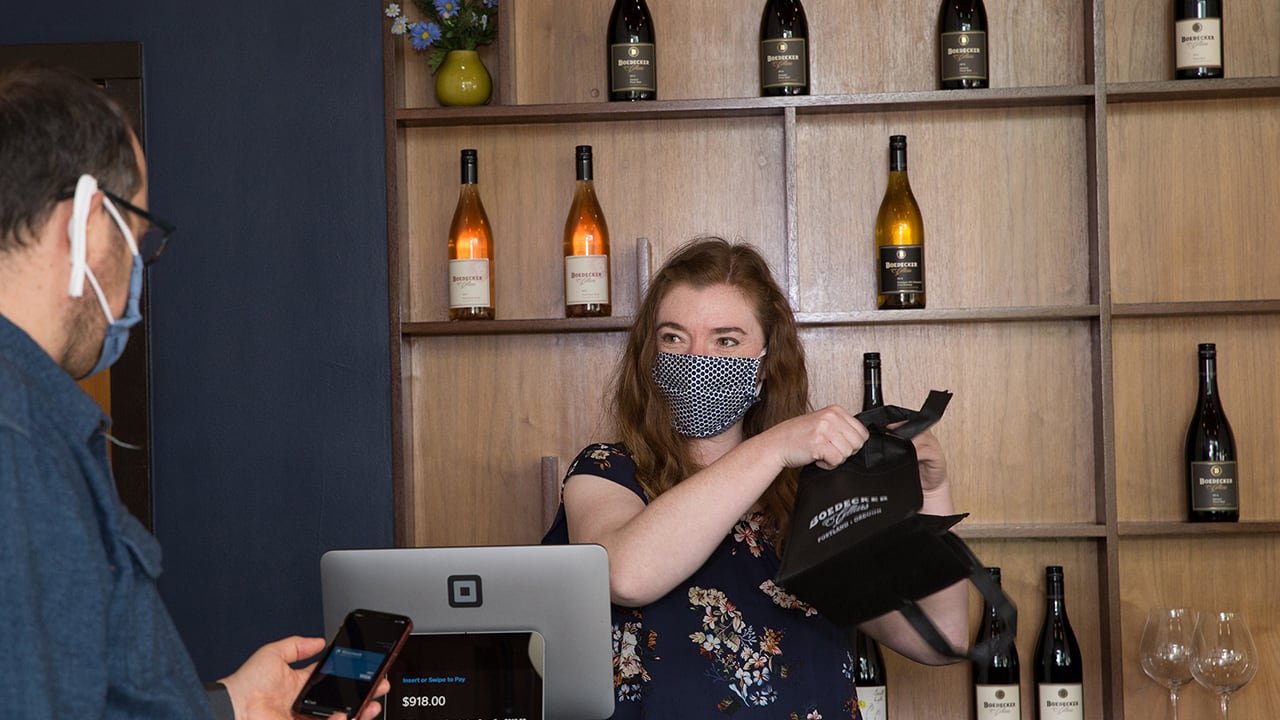Before she became a winemaker, Athena Pappas worked as a human factors engineer at Hewlett-Packard and Epson, watching how people used printers in order to improve them.
That training has come in handy, strangely enough, during the pandemic. Pappas and her husband own Boedecker Cellars in Northwest Portland, and COVID-19 has forced Pappas to redesign the 10,000-square-foot space for physically distanced customers.
She may look like she's staring into space at times, but she's really watching how people behave so she can fine-tune the operation and keep everyone safe.
"The bottleneck is at checkout," Pappas says.
Boedecker is a small winemaker, producing 5,000 cases in 2019 and 2,000 this year. Pappas relies heavily on the tasting room, so she's done everything in her power to keep it open.
Fortunately, the space has high ceilings, a loading dock where she can seat customers and rollup doors. Rather than pour wine into glasses at the bar or tables, she fills 1- and 2-ounce bottles and puts them into holes she drilled into cheese boards so she could hand flights to customers all at once.
The pre-pours break her heart because they diminish the aromatics. Worse yet, she's not serving food because it just feels like too much of a risk.
"I've been pivoting, and pivoting and pivoting," Pappas says.
And all of that was before historic wildfires produced an acrid haze that settled over wine country in September. Winemakers in hotter places like Australia and California know all about "smoke taint," but it's a new scourge in Oregon due to climate change. The volatile phenols in smoke can permeate grape skins, making the wine taste like an ashtray, or a crayon.
Worst of all, it's often hard to tell if grapes are ruined until you make wine with them because it's the fermentation process that releases the phenols. Pappas leases rows of vines at vineyards in the Willamette Valley, so she was worried. That prompted her to do a micro-fermentation about two weeks before harvest to see how the juice would taste. It passed, and she made wine—carefully.
Like many Oregon producers, Boedecker makes mostly pinot noir. Other winemakers focus more on white, which is likely to help them this year. Few white grapes were wrecked, because they're picked earlier and were safely inside when the fires raged.
Sarah Horner at Montinore Estate says the winery's white grapes were tucked away before the conflagration. Rudy Marchesi, one of the partners, has always been a fan of cool-weather grapes like riesling, Müller-Thurgau and gewürztraminer, and he grows a lot of them on his 200-acre estate in Forest Grove. Being at the northern end of the Willamette Valley also helped because the smoke was much thicker farther south.
Like Pappas, Horner has had to rely on old skills during this terrible year. After high school, she took a job with Time-Life Books, cold-calling to try to sell a series on the logging industry. It was hell. She lasted two weeks. But after COVID-19 shut down the tasting room in March, Horner and her staff hit the phones, calling wine club members and customers who had visited the winery in years past.
It turns out that wine is a much easier sell than books about logging. Their calls have helped boost online wine sales by 350% since January.
Pappas, too, is upbeat about sales. There are fewer people visiting her winery now, but those who come are buying lots of bottles and tipping heavily.
"Sometimes, I want to tear up," Pappas says.
It's been that kind of year.
UPDATE: The new lockdown does not affect Montinore because the tasting room was closed for in-person service for the season. Boedecker will offer flights to go and discounted bottles for curbside pickup or delivery through FedEx.
Portland's Restaurants Were Hanging on by a Thread. What Will They Do in a Holiday Freeze?

